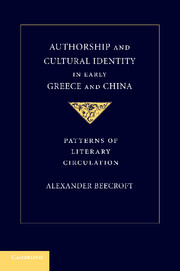Book contents
- Frontmatter
- Contents
- Acknowledgments
- Introduction
- 1 Explicit Poetics in Greece and China: Points of Divergence and Convergence
- 2 Epic Authorship: The Lives of Homer, Textuality, and Panhellenism
- 3 Lyric Authorship: Poetry, Genre, and the Polis
- 4 Authorship between Epic and Lyric: Stesichorus, the Palinode, and Performance
- 5 Death and Lingerie: Cosmopolitan and Panhuaxia Readings of the Airs of the States
- 6 Summit at Fei: The Poetics of Diplomacy in the Zuozhuan
- 7 The Politics of Dancing: The Great King Wu Dance and the Hymns of Zhou
- Conclusion: Scenes of Authorship and Master-Narratives
- Bibliography
- Index of Passages Cited
- General Index
3 - Lyric Authorship: Poetry, Genre, and the Polis
Published online by Cambridge University Press: 03 May 2010
- Frontmatter
- Contents
- Acknowledgments
- Introduction
- 1 Explicit Poetics in Greece and China: Points of Divergence and Convergence
- 2 Epic Authorship: The Lives of Homer, Textuality, and Panhellenism
- 3 Lyric Authorship: Poetry, Genre, and the Polis
- 4 Authorship between Epic and Lyric: Stesichorus, the Palinode, and Performance
- 5 Death and Lingerie: Cosmopolitan and Panhuaxia Readings of the Airs of the States
- 6 Summit at Fei: The Poetics of Diplomacy in the Zuozhuan
- 7 The Politics of Dancing: The Great King Wu Dance and the Hymns of Zhou
- Conclusion: Scenes of Authorship and Master-Narratives
- Bibliography
- Index of Passages Cited
- General Index
Summary
Where the self-effacement of the epic poet presented considerable challenges to the reverse biographical fallacy, “lyric” poetry, broadly conceived, would seem more fruitful territory. In the case of a poet such as Sappho, for whom the ancients possessed substantial bodies of poetry in which a strongly personal voice was expressed, such was indeed the case, as has already been demonstrated persuasively by others. Clearly, the substantial body of lyric poetry expressing profound emotion was fertile ground for biographical readers. That said, substantial categories of biographical material concerning Archaic Greek lyric poets clearly exceed the reach of naïve biographical criticism. In the latter half of this chapter, I will explore aspects of the biographical accounts of Alcman and Sappho that, I believe, can be explained more usefully in terms of implied poetics than of the biographical fallacy. With Alcman, I will examine the question of his birthplace, whether in Lydia or Sparta; with Sappho, I will consider a curious episode in Herodotus concerning abusive poetry she is said to have composed on the subject of her sister-in-law.
In making my arguments on these two more famous figures, I will draw on my reading (in the first part of this chapter) of an extreme case of the mismatch of biographical anecdote to poetic text, Terpander. He is representative of a category that might be labeled virtual poets, that is, poets to whom no poetry was ever attributed, or none of whose poetry survives to our time, or for whom doubts were cast in ancient times on the meager materials associated with their names.
- Type
- Chapter
- Information
- Authorship and Cultural Identity in Early Greece and ChinaPatterns of Literary Circulation, pp. 106 - 143Publisher: Cambridge University PressPrint publication year: 2010



